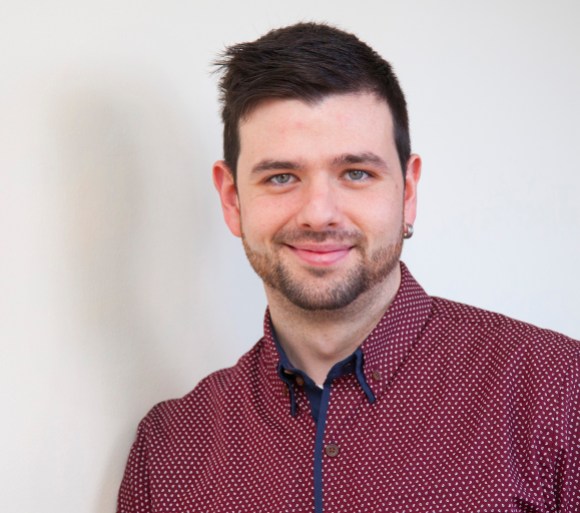
On 2 August, the National Library of Wales announced that Jason Evans, their Wikipedian in residence, would transition into the role “National Wikimedian.” In this change in role, Evans will be permanently tasked with developing collaborations, programming, and services that advance the representation of Wales and the Welsh language on Wikimedia projects.
Evans’ work has been highly successful at creating content that meaningfully reaches the public. It includes uploading images from the National Library’s collection, which have been used in Wikipedia articles that have been seen more than 250 million times; running events that have created hundreds of articles on Welsh Wikipedia; and enabling large contribution campaigns with external organizations. Recordiau Sain, for instance, shared over 7,000 audio files on Wikimedia Commons.
Jason and I talked about this role transition over a digital interview.
Alex: For folks who haven’t been following your work at the National Library of Wales: what would you describe as the highlights of that work? How has that work changed your perspective on Wikimedia, the library, or Wales?
Jason: For me, the ultimate highlight of the 30-month Wikimedia residency is the outcome—one of the world’s first full time, fully funded, permanent Wikimedia posts at a GLAM. (Editor’s note: GLAM is an acronym for galleries, libraries, archives, and museums.) But if we are looking at what led us to this point, I think the highlight has to be sharing 15,000 images to Commons, generating 300 million hits on content from the National Library If you were to ask the Library Board and senior management why they backed the project, the incredible reach and impact generated by this image release would certainly be high on their list.
Personally, I have been taken aback by the enthusiasm of the Wikimedia community, and the Welsh public, in engaging with our outreach programmes. Nearly 400 volunteers have engaged with the National Library to create over 10,000 new Wikipedia articles in English and Welsh. The library has also embraced open data: Wikidata currently has more descriptions of items with associated freely licensed images for the National Library than any other institution in the world.
In terms of changing my perspective, I have been well and truly converted to the open access movement and am now convinced that it is crucial to modernising and innovating in our GLAMs. I’ve been hugely impressed by the National Library of Wales and their attitude towards change, and investing in new ideas and approaches.
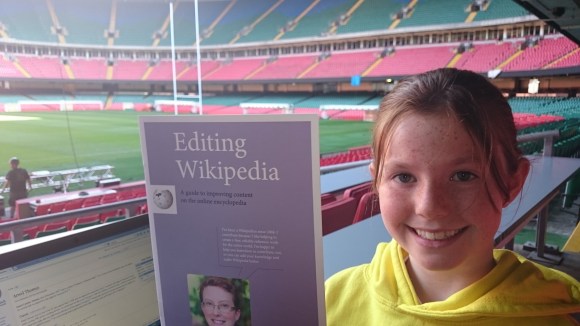
———
Alex: How does it feel to have “National” in your new title? When I think of “National” positions, I often think of either politically appointed positions like the Archivist of the United States at the U.S. National Archives, or to honorary positions like National Poet Laureate or National Bard, which recognize someone’s lifetime achievements.
Jason: It does sound important, doesn’t it! We had many discussions about the job title before finally settling on ‘National Wikimedian’ . First, we weighed the pros and cons of using ‘Wikipedian,’ which is widely understood, or ‘Wikimedian,’ a less understood concept (to the public). But for me, ‘Wikimedian’ better describes the work this position will involve—engaging with multiple Wikimedia projects, not just Wikipedia.
We toyed with ‘Wikimedia Projects Manager,’ but having ‘national’ in the title gives the role status, credibility, and sends the message that this is a job that benefits the whole country, not just the library. The ‘National Wikimedian’ will of course continue to share National Library of Wales content and run community outreach, but will also advise and assist other organisations and communities across Wales on contributing to Wikimedia and implementing open access policies.
———
Alex: I remember you telling me at one point that you didn’t start the “Wikipedian in Residence role” already thinking of yourself as a “Wikipedian/Wikimedian”, but rather someone who admired the community. Becoming a National Wikimedian, you clearly have you found your way into the community—and become an important influencer of the community at that. Did you have any “aha” moments that helped you realize the changing role/place you had within the community or movement? When did the community become an important part of who you are?
Jason: Yes. I’m ashamed to say that before I took on this role, I had only ever made a handful of edits to Wikipedia. My first real encounter with the community came after an article I had published in a journal was cited on Wikipedia. I was impressed—within weeks of me publishing my article, a comprehensive Wikipedia article had been written on the same subject, and I think it was at that moment that I truly understood what Wikipedia was all about.
In terms of my role in the community, it’s constantly evolving. I’ve tried to adapt the role in order take advantage of new opportunities and to respond to challenges, and I’m lucky that the National Library of Wales has been so flexible in allowing me to do so. So I suppose the ‘Aha’ moment was understanding that to be an effective Wikimedian in Residence, you have to listen to the community, learn, and be reactive. You can’t apply any kind of rigid structure to the role. I feel like my place within this community is to be that bridge between the grassroots movement, institutions, and even local government.
Working with Wikimedians from all over the world has helped me to understand the true value of open access, of free access for all to knowledge. Here in Wales I have also come to the conclusion that open access is vital to stimulating the use of the Welsh language, and it’s great to be part of an community with shared goals and beliefs.
———
Alex: There is a constant tension in the Wikimedia community between the need to “professionalize” (in order for the Wikimedia community to take advantage of institutional partnerships and to provide communities that want to get engaged with points of contact), and the importance of the volunteer community, which does most of the content creation and provides the governance over the projects. How does this new role balance these two competing priorities? Will it be different from being a “Wikipedian in Residence”?
Jason: As I discovered at Wikimania, the title ‘Wikipedian in Residence’ is applied to a diverse range of partnerships around the world. I suppose my new position is different to many residencies, which tend to be more focused on balancing the needs of Wikipedia with the strategic direction of the host institution.
As National Wikimedian, I will be working with the Welsh GLAM and education sectors and with the Welsh government, who have already funded two of our projects to improve content on the Welsh Wikipedia. I’m working closely with Welsh language support networks to provide Wiki training for community leaders so that they can build their own Wikimedia communities.
I hope that when we combine our community building work with all our other activities, we can find that balance between professionalism and the needs of the grassroots community. These include a drive to open up access to useful resources for editors, investment in community events and in providing technical support for content uploads. Basically, I want to be able to react to and serve our volunteer communities whilst normalizing the idea of collaboration with Wikimedia amongst information professionals—how hard can that be!
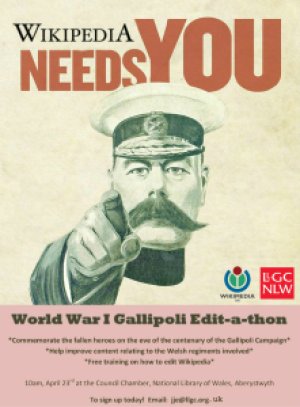
———
Alex: Indeed: I feel like that constant tension and process of volunteer community building is really challenging, but at times so amazingly rewarding, especially when you are working with existing communities. Where do you see your role fitting into the larger community working on the Welsh-language internet, by ensuring the language’s modern utility and creating space for it in the internet?
Jason: The National Library of Wales and the Welsh Government—and Wikimedia UK, for that matter—are really keen to develop the digital presence of the Welsh language, and there are some great initiatives happening up and down the country. Wikipedia is the most visited Welsh-language website out there, so it is vital that we develop it. What’s great about Wikipedia is that it gives people a platform to be proactive in preserving their language, and we have a lot of pride in ours! Wikipedia allows anyone to publish content in Welsh. Whether they create entirely new articles or simply improve existing ones, there are tasks that suit all abilities. This means that anyone with passion for their language can be a part of its preservation and development.
I have also been preaching Wikidata for some time now as an important element of the Wikimedia movement. There are already over a million Wikidata items with Welsh labels. If we invest time and energy in developing Welsh Open Data now it will be a fruitful resource for Welsh apps and programme developers for years to come. And as the Wikipedia mainspace begins to incorporate more and more Wikidata, having lots of Welsh language data will be a big help. So in short—Wikimedia projects are key to developing the Welsh language’s digital infrastructure, and part of my role will be promoting this by seeking out mutually beneficial opportunities to collaborate with the wider community.
———
Alex: Part of what I have found so interesting about your residency is that you have effectively used it to empower organizations and communities beyond the walls of the library. I feel like a lot of us who do outreach to cultural heritage institutions, as volunteers or in professional capacities, find that one successful project leads to an avalanche of interest from folks at other institutions who “want to do something similar also”. How do you balance both your institutions and the potential for other partner institutions?
Jason: Yes, there certainly seems to be a kind of snowball effect in play in Wales at the moment, with lots of different parties interested in either taking on their own Wikipedian-in-residence or simply teaching their staff how to run wiki events. It can be hard to balance supporting this growing movement with securing outcomes which align directly with the National Library of Wales’ strategy. I try to encourage and enable other institutions to become self sufficient with their activities by training trainers, rather than simply running their training for them.
However, some opportunities are simply too good to miss, and we have invested a fair amount of time at the National Library supporting others. For example, we helped Wales’ historical environment service (CADW) upload all Welsh-listed building data to Wikidata. How does the National Library benefit from this? Well, for a start it gives us the opportunity to form new partnerships and reach new communities. More importantly, as a publicly funded body competing for limited funds, these kind of projects demonstrate the true value of the National Library as an umbrella institution that can support and advise others to help advance free and open access to information across the whole culture sector. And I think, in this digital age, this is how we should see our libraries. We are here to provide our communities with access to knowledge and information, and that increasingly means looking beyond our own physical holdings.
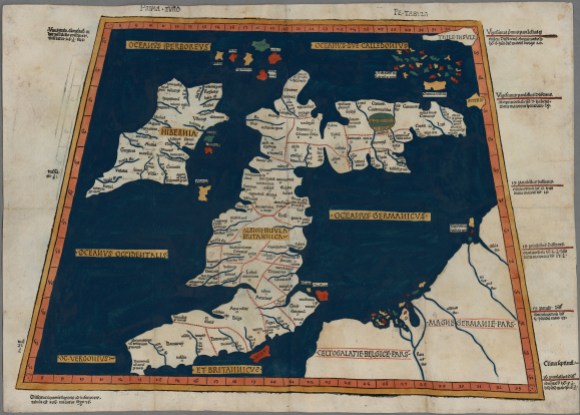
———
Alex: What about your role will surprise people? Do you have any crazy, unconventional, or exciting projects brewing?
Jason: Alas, nothing particularly unconventional. However, many people are surprised when I tell them what the role entails. Lots of people tend to envision me as some kind of Wiki Grand Master writing hundreds of articles a day and scrupulously reviewing every word ever written on Wikipedia! And I think this highlights the need for everyone running Wikimedia projects to take every opportunity to explain what they do. It’s when people hear it from the horse’s mouth that doors tend to open.
As for exciting projects, we have just finished up with Wici-pop, which was good fun and really engaged a lot of younger people with editing for the first time. But perhaps the most exciting outcome with this project was getting 30-second freely licensed sound clips from the entire catalogue of the largest record label in the Welsh language for Wikimedia Commons. As far as I know, no other record label has been so bold.
As for the future, there are lots of exciting things brewing—but it is all top secret at the moment, I’m afraid.
———
Alex: You mention that we should “take every opportunity to explain what [we] do” as Wikimedia contributors. One of my biggest challenges when working with the Wikimedia community, from when I started editing as a volunteer until now as a staff member at the Wikimedia Foundation, has been that even though program organizers become very good at explaining the Wikimedia story, the average volunteer with 5, 10, 50 or 100 edits, or even thousands, doesn’t always feel like they can explain the impact and importance of their work. You have been building quite a community in Wales: do you have any tips, tricks or strategies for helping Wikimedians feel empowered to “explain”?
Jason: This is an interesting one. From my experience, most volunteers understand the value of their work. However, many simply do not want to be advocates. That could simply be down to confidence or personality, or maybe they feel that as editors their time is best spent editing. There is a risk that if you push volunteers too hard to be more active in promoting their work that they will disengage completely.
So I feel that to some extent it is our role as project coordinators to lead the advocacy work and highlight what our Wikipedians are doing and why. However, every now and then you do come across volunteers who want to do more than edit, and part of the reason the National Library adopted the visiting scholar scheme was to recognise and support these volunteers, to formalise their role in some way so that the do feel empowered to blog and tweet and share their work with the world.
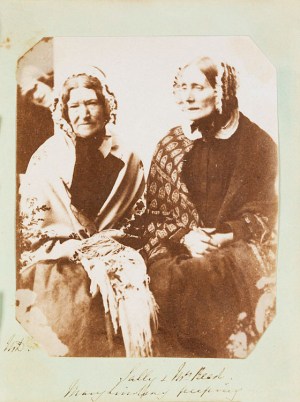
———
Alex: What is your favourite media file from the projects that you have done so far?
Jason: It has to be the world’s first photobomb (above)!
It might not be the most valuable media file in terms of what it brings to Wikipedia, but it’s a gem. It’s also mind bending to think that the older lady in the picture was almost certainly born in the 1700s. The image is part of an album we uploaded to Commons which also contains what are widely regarded as the first photograph of a smile, and the first-ever photograph of a snowman.
Alex Stinson, Strategist, Community Engagement, Wikimedia Foundation
Jason Evans, National Wikimedian, National Library of Wales

Can you help us translate this article?
In order for this article to reach as many people as possible we would like your help. Can you translate this article to get the message out?
Start translation